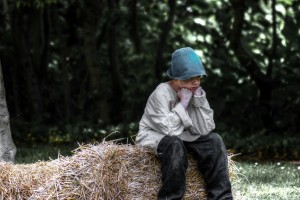Everyone displays problematic behavior at some point, whether it is overreacting to being cut off on the freeway or coping in not-so-healthy ways (e.g., emotional eating). This is especially true for children, since a child’s brain is continuing to grow and does not become fully mature until early adulthood.
Furthermore, although a child may be able to control his or her behavior in some situations, other times, especially when emotionally overwhelmed, the same child may actually be unable to control his or her behavior/reactions. This, although mind boggling and frustrating at times, is completely normal!
 On the other hand, there are some child behavior problems that you definitely should not ignore, especially when these problems become habitual or negatively impact a child’s functioning and/or relationships. It is at this point that it is time to seek help. By intervening early, you have a chance at eliminating the behavior before the problem escalates and/or has significant consequences.
On the other hand, there are some child behavior problems that you definitely should not ignore, especially when these problems become habitual or negatively impact a child’s functioning and/or relationships. It is at this point that it is time to seek help. By intervening early, you have a chance at eliminating the behavior before the problem escalates and/or has significant consequences.
Regardless of the child behavior problems you are facing in your home, there is hope! A child’s brain has amazing capacities for growth and change. Furthermore, caregivers and other adults are vital partners in helping a child develop healthy coping skills and the ability to regulate emotions and, therefore, behavior.
As we examine specific behavior problems, keep in mind what the behavior could represent for the child in question. I like what Daniel Siegel, M.D. and Tina Payne Bryson, Ph.D. write in their book, No Drama Discipline (2014). These authors state that it is important to “chase the why” when it comes to a child’s behavior.
Rather than making an assumption, which is often based on our own emotional response, it is important to become a detective and look at what could be fueling the behavior. As we examine each problematic behavior, I encourage you to “chase the why.”
10 Child Behavior Problems You Should Not Ignore
Here are several child behavior problems that should not be ignored:
1) Lying
Let’s be honest … Everyone has lied at some point. However, lying becomes a problem when a child engages in habitual lying. There are many reasons as to why a child may lie. Lying sometimes occurs when a child is anxious and fearful, as a way to avoid or manage the feared object.
 When a child is struggling with self-esteem, he or she may lie in an attempt to make himself or herself seem better to others. A child may also lie in order to avoid the intense feelings of shame that accompany getting into trouble or failing due to lack of self-confidence.
When a child is struggling with self-esteem, he or she may lie in an attempt to make himself or herself seem better to others. A child may also lie in order to avoid the intense feelings of shame that accompany getting into trouble or failing due to lack of self-confidence.
Furthermore, according to Carol Brady, PhD, when a child has Attention-Deficit/Hyperactivity Disorder (ADHD), he or she may lie because of impulsivity (ADDitude Magazine). Basically, they talk before they think.
2) Stealing
Like lying, it is not uncommon for a young child to attempt their hand at stealing. However, most children quickly learn that stealing is not acceptable. Stealing becomes a problem when it continues. What are some reasons that a child may steal? The adrenaline rush that momentarily boosts feel-good chemicals? A feeling of control? There could be many reasons that a child turns to stealing.
3) Violence Toward Self, Others, or Property/Bullying
Whenever a child threatens self or others, whether it be threatening to kill themselves or hurt someone else, it is critical to take what they say seriously. This also goes for behaviors such as self-injury (e.g., scratching, cutting) and bullying others.
These alarming behaviors can indicate that the child is dealing with deep emotional struggles, such as depression.In fact, self-harm is one way that some individuals cope with painful emotions that they cannot otherwise manage. With any suicidal/self-harm talk or violence toward self or others, it is important to seek professional help immediately.
4) Temper Tantrums
Temper tantrums are normal for children. Children are developing emotional regulation. When a child becomes dysregulated, a temper tantrum can result. Emotion regulation has to do with brain maturity and is also affected by environmental stressors (e.g., school and social stress).
 Throughout my years of counseling children, I have noticed that children who have more sensitive temperaments (i.e., a child who feels emotions strongly and takes longer returning to baseline than someone who is less sensitive) often taking longer to develop the emotion regulation skills needed to not “freak out” when strong and out-of-control feelings arise.
Throughout my years of counseling children, I have noticed that children who have more sensitive temperaments (i.e., a child who feels emotions strongly and takes longer returning to baseline than someone who is less sensitive) often taking longer to develop the emotion regulation skills needed to not “freak out” when strong and out-of-control feelings arise.
There are ways that parents and caregivers can soothe the tantrum rather than “enrage” the brain (Siegel & Bryson, 2014). There are also tools that children can learn when they start to feel overwhelmed that can prevent a melt down. It takes a team approach and a lot of patience!
When a child is frequently having temper tantrums that lasts a significant amount of time or the child becomes violent to self or others, this is a sign that you may want to seek help. If you feel at your wits end, this is also also an indicator that you may need help. A counselor can help you and your child to learn strategies that will help your child to develop emotion regulation skills.
5) Argumentative/Disrespectful Attitude
When a child suddenly starts becoming disrespectful and defiant toward authority, this may be a sign that they are struggling emotionally. Maybe the child feels out of control and is using the only tools he or she has to assert control.
On the other hand, it is possible that the child is feeling more irritable due to depression or anxiety. It is also possible that this child is imitating friends or testing limits.
6) Ignoring Others
Although ignoring someone can be a sign of defiance, it can also be an indicator that something more is going on in your child. For example, one symptom of inattentive ADHD is that an individual does not appear to listen. Rather than purposely tuning into someone else, this person’s thoughts may wander or run ahead of the conversations.
The child may be in his or her own imagination and have difficulty focusing on the present situation. If ADHD is the reason for ignoring behavior, children are able to learn tools to cope with inattention. Alternatively, when a child begins to “ignore” and seem to be in their own world, it may be a sign that he or she is struggling emotionally.
Rather than being able to verbalize what is occurring internally, the child turns inward and withdraws. Whatever the case, when ignoring becomes habitual, it is time to seek help in order to determine the reasons behind the behavior.
7) School Refusal
School refusal is not always as simple as a child disliking school or learning. When a child starts to refuse to go to school, has meltdowns prior to school, or complains of physical symptoms (e.g., headaches and stomach aches) on a regular basis before school, this is a sign that something is going on with the child.
What are they trying to tell you with their behavior? There are many reasons as to why a child dreads attending school. Children may develop separation anxiety, where they fear being separated from their caregiver or that something bad will happen to their caregiver.
It could also be that the child has started to experience bullying at school but is afraid to talk to an adult about the bullying. Sometimes a child who struggles with a learning disability or processing disorder may experience anxiety and stress associated with learning.
Other common reasons for difficulty going to school include anxiety and depression. A therapist can help to tease out what is at the root of the school refusal and provide tools for combating the problem.
8) Lack of Motivation
Similar to children who express difficulty attending school, children who appear “lazy” or unmotivated may also have more going on than meets the eye. In fact, having a lack of motivation is one of the criteria for being diagnosed with depression! Maybe the child feels hopeless about succeeding in school. It is also possible that anxiety is keeping the child “paralyzed.”
9) Substance Use
This problem is likely an obvious behavior that you should not ignore. And, yes, substance use can start in childhood. However, it is important, as with all other behaviors, to examine why a child is turning to substances.
Is it for coping with difficult emotions? Is it because they want to fit in? Regardless of the reason, it is important to intervene before substance use escalates or has negative consequences.
10) Early Sexualized Behavior
As with substance abuse, when children begin to display sexualized behavior this can be a sign that something more is occurring internally. Again, it is important to understand the underlying reason for this type of behavior and what type of sexual material they have been exposed to. Knowledgeable professionals can help to point you in the right direction.
What To Do About Child Behavior Problems
Remember the detective? Once you know what the cause of the behavior is, you can then intervene in an effective manner to promote healthy brain development. Remember that the goal is to find the root causes to the behavior rather than just seeing the behavior as the problem (Siegel & Bryson, 2014).
 The first step (after talking a moment to calm yourself!) is to ask yourself, “What is really going on with this behavior? Is my child stressed because of problems with friends? Is he overwhelmed with tension at home? Is she struggling in school? Does he lack the tools to even regulate strong feelings?”
The first step (after talking a moment to calm yourself!) is to ask yourself, “What is really going on with this behavior? Is my child stressed because of problems with friends? Is he overwhelmed with tension at home? Is she struggling in school? Does he lack the tools to even regulate strong feelings?”
Sometimes what we see as “bad behavior” is actually an adaptive response for children because this is the only way that they can cope with a challenging situation (Siegel & Bryson, 2014).
For example, a child may fake being sick because of a test that she is afraid of failing. She is so anxious about the test that she copes with the feelings by attempting to avoid the situation, not because she is lazy or bad.
As we talked about earlier, we all have engaged in negative coping … eating too much when we are sad or flying into a rage when feeling that someone is being disrespectful. Children are no different, plus they lack the fully developed brains that adults have.
Putting that into perspective, it makes complete sense that children would not always cope in healthy ways and we should not expect the to do so. This does not mean that we ignore problematic behaviors but, instead, discover what tools they need to learn and then teach them these skills.
When we look for what the child is trying to accomplish through the behavior rather than jumping to a negative conclusion, we are able to understand what is really going on. A therapist who understands emotional brain development will be able to teach you and your child strategies that aid in healthy brain development.
When To Seek Help
If your child is expressing that he or she wants to harm himself or herself or someone else, it is important to seek professional help immediately. If a problematic behavior is consistently displayed or begins having a negative impact on functioning (e.g., grades or relationships), it would be important to contact a professional to evaluate if something more serious is occurring.
If you feel overwhelmed and at your wits’ end, you may find relief by learning new tools to help yourself and your child. When you are ready, help is just a click or a phone call away!
ResourcesHuebner, D., & Matthews, B. (2005). What to do when you worry to much: A kids’ guide to overcoming problems with anxiety. Washington, D.C.: Magination Press.
Huebner, D., & Matthews, B. (2007). What to do when your temper flares: A kids’ guide to overcoming problems with anger. Washington, D.C.: Magination Press.
Siegel, D. J., & Bryson, T. P. (2011). The whole-brain child: 12 revolutionary strategies to nurture your child’s developing mind. New York: Delacorte Press.
Siegel, D.J., & Bryson, T.P. (2014). The yes brain: How to cultivate courage, curiosity, and resilience in your child. New York: Bantam Books.
References
Siegel, D.J., & Bryson, T.P. (2014). No-drama discipline: The whole-brain way to calm the chaos and nurture your child’s developing mind. New York: Bantam Books.
https://www.additudemag.com/slideshows/what-to-do-when-your-child-lies/, Retrieved 1/29/18.
Photos
“Upset,” courtesy of Theorivierenlaan, pixabay.com, CC0 License; “Eyes,” courtesy of Luca Campioni, unsplash.com, CC0 License; “Pouting,” courtesy of martakoton, pixabay.com, CC0 License; “Hope,” courtesy of Lina Trochez, unsplash.com, CC0 License




